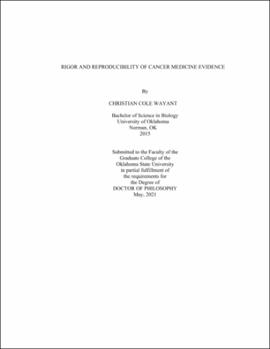| dc.contributor.advisor | Vassar, Matt | |
| dc.contributor.author | Wayant, Christian Cole | |
| dc.date.accessioned | 2021-09-24T13:33:10Z | |
| dc.date.available | 2021-09-24T13:33:10Z | |
| dc.date.issued | 2021-05 | |
| dc.identifier.uri | https://hdl.handle.net/11244/330894 | |
| dc.description.abstract | The burden of cancer in the United States and abroad is comprised of significant morbidity, mortality, and psychological or financial harms. There remains a concern that the influence of published research is not maximized because of bias, lack of reproducibility, and suboptimal transparency. This dissertation comprises 10 investigations of such shortcomings. As a result of these 10 studies we first found that oncology journal policies on reporting guidelines and trial registration could be improved to strengthen the transparency in published research. We found that key improvements to oncology interventions in trials could facilitate better translation of published results to daily clinical practice. An investigation of financial relationships between oncologist-authors of influential trials and pharmaceutical drug firms uncovered pervasive, large, often undisclosed conflicts of interest. In a cohort of published trials, we found that oncologist authors misrepresented or distorted their findings to highlight favorable findings, even if this meant downplaying patient-centered endpoint results. We evaluated the potential harm from the publication of interim trial reports before patient-centered endpoints have accrued the necessary events to be fully powered. We reviewed a broad cohort of drug advertisements and found that drug firms omitted endpoints that were unfavorable, potentially compromising the integrity of the drug's advertised efficacy. We found that noninferiority trials, which are increasingly important in oncology research, were poorly designed and used statistical practices which may compromise their robustness. We turned to systematic reviews, finding that one's ability to reproduce the results of oncology meta-analyses was compromised by incomplete reporting of basic patient data. We found a significant risk of bias in systematic reviews cited by prominent cancer practice guidelines were at risk of bias. We investigated prominent cancer practice guidelines and found that patient values and preferences were undervalued. Altogether, the results of these ten studies indicate that oncology research requires a number of major and minor improvements to maximize its ability to work fully for the patient's benefit. | |
| dc.format | application/pdf | |
| dc.language | en_US | |
| dc.rights | Copyright is held by the author who has granted the Oklahoma State University Library the non-exclusive right to share this material in its institutional repository. Contact Digital Library Services at lib-dls@okstate.edu or 405-744-9161 for the permission policy on the use, reproduction or distribution of this material. | |
| dc.title | Rigor and reproducibility of cancer medicine evidence | |
| dc.contributor.committeeMember | Rouch, Al | |
| dc.contributor.committeeMember | Benjamin, Bruce | |
| dc.contributor.committeeMember | Som, Mousumi | |
| dc.contributor.committeeMember | Miller, Bavette | |
| osu.filename | Wayant_okstate_0664D_17149.pdf | |
| osu.accesstype | Open Access | |
| dc.type.genre | Dissertation | |
| dc.type.material | Text | |
| dc.subject.keywords | bias | |
| dc.subject.keywords | cancer | |
| dc.subject.keywords | meta-research | |
| dc.subject.keywords | oncology | |
| dc.subject.keywords | reproducibility | |
| dc.subject.keywords | research quality | |
| thesis.degree.discipline | Biomedical Sciences | |
| thesis.degree.grantor | Oklahoma State University | |
